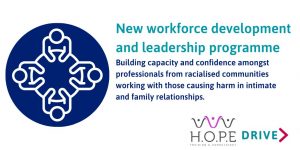16.02.2024
H.O.P.E Training & Consultancy have been leading on a second leadership programme for Black & Racilaised staff across England & Wales working within VAWG. This programme had 24 learners complete the course over a 12 week period with a hybrid approach looking at a range of different subject matters centred around leadership. We have been supported by the Drive Partnership and MOPAC to fund spaces for “by & for” organisations who required a space and a number of VAWG services have funded spaces for their staff directly which we are very grateful for.
On the 16th February 2024 all of the learners will be presenting in London to an audience of 100 about their journey and what leadership means to them.
We will be joined by our distinguished guests such as Dr Olumide Adisa, Claire Waxman (Victims Commissioner for London), Mel Thomas (Leicestershire police), Manjit Atwal (College of Policing Strategic lead for Violence Against Women and Girls and Operation Soteria) and Suzanne Jacobs (CEO Safelives) who all will be part of the certificate ceremony and supporting H.O.P.E in congratulating all learners in graduating.
A full summery report about our 2nd leadership programme will be available on our website in due course. We would like to thank Paul Morris & Dr Roxanne Khan from Onevidence for supporting H.O.P.E with the data collection and report summery on this programme.
Feedback from our learners:
“Completing this leadership course has inspired me in so many arears of my professional and personal life. My confidence levels have elevated and my knowledge has been enhanced. To have been coached by such an amazing array of leaders who look like me has been an awesome and inspiring experience.”
“This has been a wonderful experience and I will take away many meaningful tools on the rest of my journey, embracing change as I progress in an empowered way”
“This course has comprehensively put together everything I should know about being a leader of colour, whether be it dealing with colleagues, people I don’t work with, and most specially myself. I can never emphasise enough how necessary this training is for everyone, whether they are leaders or not. It has not only strengthened my leadership qualities but educated me.”














